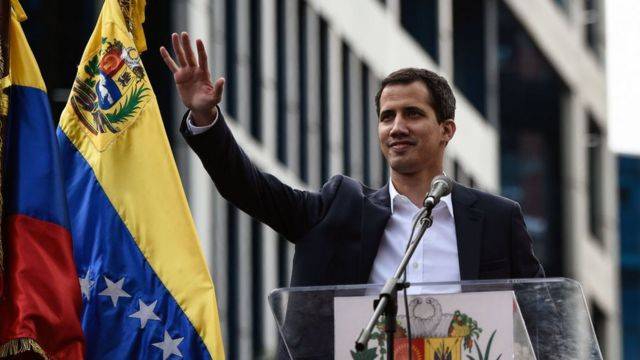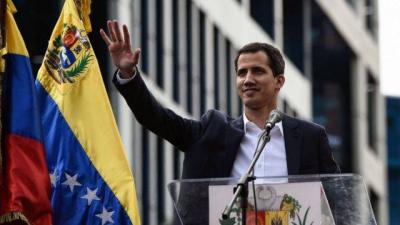U.S. President Joe Biden reaffirmed American support for Venezuelan opposition leader Juan Guaidó in a message sent on Monday, coinciding with Venezuela's national day. In his message addressed to "Mr. President" Guaidó, Biden wrote, "We are more determined than ever to support the struggle for freedom for all Venezuelans through a peaceful and democratic transition of power in Venezuela." The U.S. president further addressed the Venezuelan opposition leader, stating, "Under your leadership and in alliance with civil society leaders, you uphold these ideals of freedom, democracy, and sovereignty." Biden sent his message to Guaidó through the Venezuelan affairs office in neighboring Colombia, according to an official from that office speaking to AFP.
On Monday, Venezuela celebrated its independence anniversary, which marks July 5, 1811. Guaidó, the former president of the National Assembly, proclaimed himself interim president of the country in January 2019 after the opposition and parts of the international community refused to acknowledge socialist President Nicolás Maduro's victory in the 2018 elections, which the opposition boycotted. Around 50 countries, led by the United States, recognized Guaidó as interim president, imposing severe economic sanctions on Maduro's regime in an attempt to oust him from power. However, Maduro, who enjoys support from the military domestically and from Russia and China internationally, has withstood attempts to overthrow him, while the country has plunged deeper into a severe political, economic, and humanitarian crisis.
On June 25, the United States and the European Union expressed their readiness to reconsider the sanctions imposed on Maduro's regime if he takes steps toward conducting "credible elections." In recent weeks, negotiations between the government and the opposition in Venezuela have been mediated by the international community. However, the Venezuelan opposition has recently been divided between those in favor of participating in regional elections scheduled for November and those opposed, currently engaged in internal discussions to reach a unified position on the matter. The opposition boycotted the presidential elections in 2018 and the legislative elections in 2020.
On Friday, Maduro accused the Central Intelligence Agency (CIA) and the U.S. military of planning to assassinate him, questioning whether Biden had authorized such actions. He commented on visits made by CIA Director William Burns and U.S. Southern Command Admiral Craig Faller to Colombia and Brazil, asking, "Did Joe Biden approve Donald Trump's orders to lead Venezuela into civil war and kill us? Yes or no? I ask." He added, "What did they do? Our sources in Colombia confirm to us (...) that they came to prepare a plan targeting me and important political and military leaders (...) Did President Joe Biden allow the plan aimed at my assassination and the assassination of senior political and military leaders in Venezuela? Yes or no?"
Maduro regularly denounces alleged plans for a coup, military invasion, or assassination without providing evidence for these accusations. He attributes responsibility for these plots to the United States and its regional allies, who did not recognize his re-election in 2018. Venezuela has been experiencing a severe political, economic, and social crisis for years, with its economy in recession for eight years and inflation skyrocketing, reaching nearly three thousand percent in 2020. Since 2019, approximately six million people have fled Venezuela, which has been engulfed in political crisis and ongoing economic stagflation, and have been received by 17 countries in Latin America and the Caribbean.




